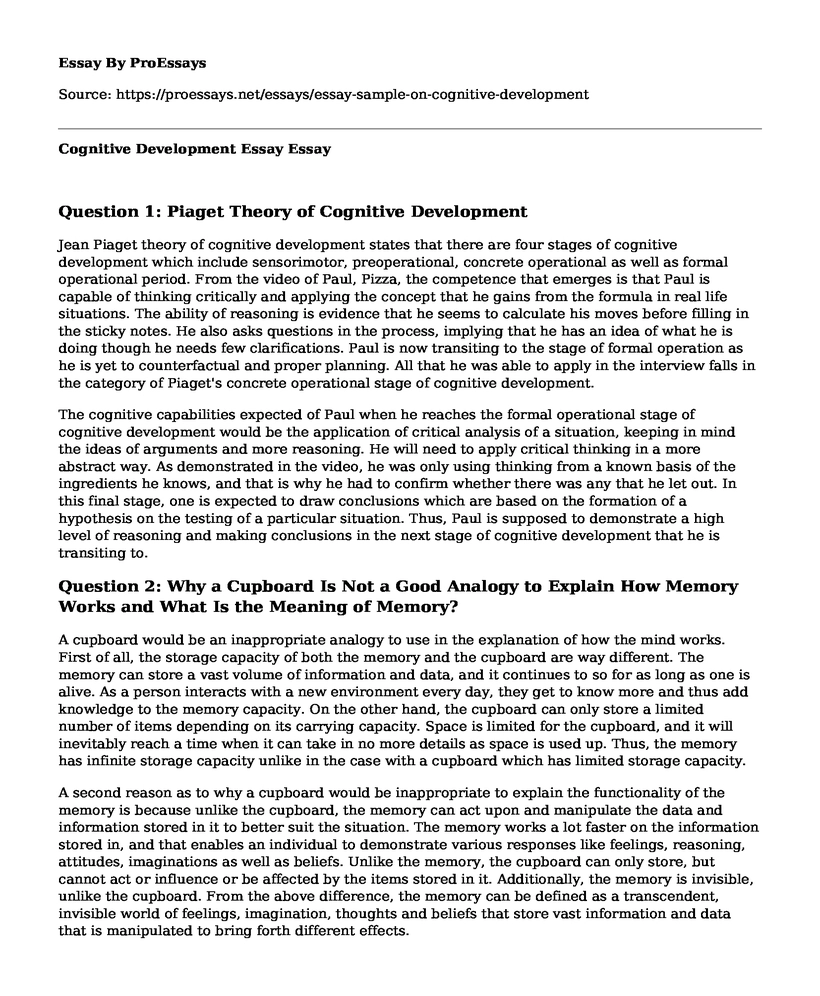Question 1: Piaget Theory of Cognitive Development
Jean Piaget theory of cognitive development states that there are four stages of cognitive development which include sensorimotor, preoperational, concrete operational as well as formal operational period. From the video of Paul, Pizza, the competence that emerges is that Paul is capable of thinking critically and applying the concept that he gains from the formula in real life situations. The ability of reasoning is evidence that he seems to calculate his moves before filling in the sticky notes. He also asks questions in the process, implying that he has an idea of what he is doing though he needs few clarifications. Paul is now transiting to the stage of formal operation as he is yet to counterfactual and proper planning. All that he was able to apply in the interview falls in the category of Piaget's concrete operational stage of cognitive development.
The cognitive capabilities expected of Paul when he reaches the formal operational stage of cognitive development would be the application of critical analysis of a situation, keeping in mind the ideas of arguments and more reasoning. He will need to apply critical thinking in a more abstract way. As demonstrated in the video, he was only using thinking from a known basis of the ingredients he knows, and that is why he had to confirm whether there was any that he let out. In this final stage, one is expected to draw conclusions which are based on the formation of a hypothesis on the testing of a particular situation. Thus, Paul is supposed to demonstrate a high level of reasoning and making conclusions in the next stage of cognitive development that he is transiting to.
Question 2: Why a Cupboard Is Not a Good Analogy to Explain How Memory Works and What Is the Meaning of Memory?
A cupboard would be an inappropriate analogy to use in the explanation of how the mind works. First of all, the storage capacity of both the memory and the cupboard are way different. The memory can store a vast volume of information and data, and it continues to so for as long as one is alive. As a person interacts with a new environment every day, they get to know more and thus add knowledge to the memory capacity. On the other hand, the cupboard can only store a limited number of items depending on its carrying capacity. Space is limited for the cupboard, and it will inevitably reach a time when it can take in no more details as space is used up. Thus, the memory has infinite storage capacity unlike in the case with a cupboard which has limited storage capacity.
A second reason as to why a cupboard would be inappropriate to explain the functionality of the memory is because unlike the cupboard, the memory can act upon and manipulate the data and information stored in it to better suit the situation. The memory works a lot faster on the information stored in, and that enables an individual to demonstrate various responses like feelings, reasoning, attitudes, imaginations as well as beliefs. Unlike the memory, the cupboard can only store, but cannot act or influence or be affected by the items stored in it. Additionally, the memory is invisible, unlike the cupboard. From the above difference, the memory can be defined as a transcendent, invisible world of feelings, imagination, thoughts and beliefs that store vast information and data that is manipulated to bring forth different effects.
Question 3: Neo-Constructivists Idea of Knowledge Acquisition Process for Children
Neo-activists argue that the development of concepts by human beings is a specific domain. The children in the video clip argue for something to be considered alive, it has to have a heartbeat, grow and be able to breathe. Thus, they are not sure whether the germs are alive till to the point that the interviewer directs them to know that the bacteria grow. From their reasoning capacity, it can be said that the children gain their knowledge from both a common source - their mother as well as from experience. The children argue that for an organism to be able to grow and develop, it must be naturally in a similar way their mother nurtured them.
The cognitive development in children is from their peers as well as the surrounding, but not specifically from experience. They are still young and accordingly, they relate their knowledge from the things that happen in their surroundings like how they see things like buildings and plants. The art of problem-solving demonstrated by the children is learning from those older than they are as well as thinking. Through learning, they get to identify that something needs to be nurtured to grow, and through thinking, they understand that only things that breath, with a heartbeat and that develop can be considered as alive. Despite the fact that they do not mention anything to do with schooling, the idea is that they had to learn the concepts they apply in their reasoning to what they perceived to happen in their surroundings.
Works Cited
"Individual Essay Question 3 - Casey And Lee, Life.Mp4". Dropbox, 2017, https://goo.gl/xeugSv.
"Paul, Pizza.Mov". Dropbox, 2017, https://goo.gl/E0NlZx.
Cite this page
Cognitive Development Essay. (2021, Jun 14). Retrieved from https://proessays.net/essays/essay-sample-on-cognitive-development
If you are the original author of this essay and no longer wish to have it published on the ProEssays website, please click below to request its removal:
- The Population, Health Behavior, and the Root Cause of the Behavior
- Essay Sample on Classroom Activities Before Christmas
- Essay Sample on Personality: Nature vs Nurture
- Essay Example on Exploring Cognitive-Psychosocial Development: Vygotsky & Erikson
- Essay Example on Overcoming Exam Stress: Strategies to Reduce Test Anxiety
- Research Paper Example on Impact of Experiential Marketing on UK Consumers' Behaviour
- The Lay of the Nightingale - Book Review Sample







